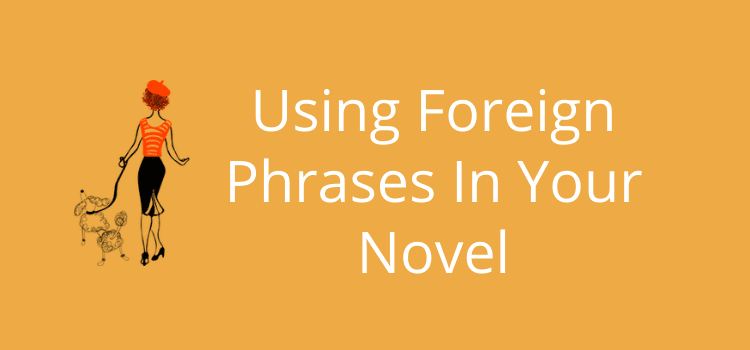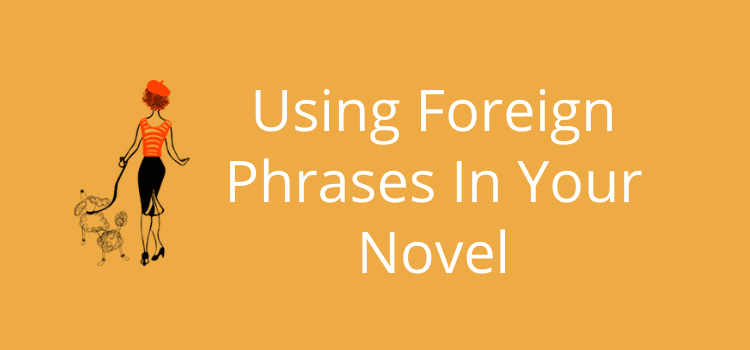Foreign Phrases In Your Novel – Never Use Google Translate

It’s often a temptation to use foreign phrases in a novel to add authenticity.
If you set your story in Paris, for example, adding some dialogue in French might seem like a good idea.
However, there are some traps that you can fall into that could have a negative effect on your readers.
When you are considering using foreign expressions or phrases, you need to take a little extra care.
Will readers understand foreign phrases?
You might think it’s a great idea to use a sentence in another language.
But are you sure that your readers will understand what it means? For well-known expressions, it might be appropriate.
However, for a longer sentence, there is a danger that some readers won’t understand it.
Here’s an example of a simple question.
“À quelle heure part le prochain train pour Lyon ?” he asked.
It might be better to avoid a sentence such as this by rephrasing it in reported speech.
He asked me in French, but I understood that he wanted to know when the next train to Lyon was leaving.
There is also the possibility that your question in French might not be commonly used. Perhaps there is a better alternative.
Vous savez à quelle heure est le train pour Lyon?
Only a French speaker could help you make a decision such as this.
Never trust Google Translate
It stands out like a sore thumb in a novel when an author relies on online translation.
So often, a phrase is in the wrong level of formality, incorrect gender, does not fully consider the subtleties of cultural behavior, does not take the context into account, or is a phrase that is rare in everyday use.
In other words, it just doesn’t fit.
Here’s an example of how things can go wrong.

A simple question such as what’s your name is an excellent example of the weakness of online translation.
There are at least five ways to ask this simple question in French, and each one depends on context.
Are you asking a child, an adult, a police officer, or a new client?
Quel est votre nom ?
Quel est ton nom ?
Comment vous appelez vous ?
C’est quoi ton nom?
Votre nom, s’il vous plaît?
If you use Google Translate, you can run into so many issues like this.
Translating English modal verbs like can and could is another problem that online translation struggles to get right.
Google Translate is a terrific tool to use if you are doing research for your book. But other tools, such as Linguee, provide more context.
If you find useful sites in another language when researching for your book, you can quickly get an English version.
I get emails in French and German, so for me, both Google Translate and Linguee are tools I use frequently.
They are great tools for reading but not so reliable for translating text in context if you don’t have a good knowledge of the language.
How can you get foreign phrases right?

The only way to be sure is to seek help from a native speaker in the language you intend to use.
While the two sentences below have the same meaning, which one would best fit the context of your writing.
Je suis désolé, mais je ne vois pas de réservation pour vous.
J’trouve pas pas votre réservation!
Only someone fluent in the language can decide.
You can always find professional translators online.
But if you would prefer not to pay for the service, you could try your social media contacts.
If it’s only a few lines, you will probably find someone willing to help you.
A little goes a long way
There’s nothing wrong with using foreign phrases in a novel.
They can add a little “flavor” to your story, especially if you are writing about local food or wine.
Also, using a city or country name in the language can work well. Perhaps, Londres instead of London, or Royaume Uni in place of United Kingdom.
But when it comes to dialogue, it’s always better to use it in moderation.
Only use phrases or sentences that you think are necessary and that your reader will be able to understand easily.
If you use too much, you are bordering on writing a foreign language novel.
Summary
Make it easy to read your book.
When you add passages in a foreign language that are difficult to read, you stand a chance of losing your readers.
It’s similar to trying to write with an accent, which is sometimes referred to as eye dialect. It’s extremely difficult unless you really know what you are doing.
A far better way is to write your dialogue normally and then add, he said in his thick Yorkshire accent.
There’s no right or wrong way, but too much of anything is rarely a good idea.
Yes, add some foreign phrases for sure.
But double-check with someone who can confirm that they are correct and fit the context.
The post Foreign Phrases In Your Novel – Never Use Google Translate appeared first on Just Publishing Advice For Writers and Authors.

